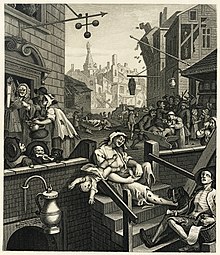
Back Alkoholisme Afrikaans كحولية Arabic Alcoholismu AST Alkoqolizm Azerbaijani الکولیزم AZB Алкоголизм Bashkir Алкагалізм Byelorussian Алькагалізм BE-X-OLD Алкохолизъм Bulgarian মদ্যাসক্তি Bengali/Bangla
| Klassifikation nach ICD-10 | |
|---|---|
| F10 | Psychische und Verhaltensstörungen durch Alkohol |
| F10.2 | Abhängigkeitssyndrom |
| ICD-10 online (WHO-Version 2019) | |

Die Alkoholkrankheit (auch Alkoholabhängigkeit, Äthylismus, Dipsomanie, Potomanie, Trunksucht, Alkoholsucht oder Alkoholismus genannt) ist die Abhängigkeit von Alkohol, insbesondere der psychotropen Substanz Ethanol (Äthylalkohol).
Gemäß WHO-Schätzung hatten Stand 2024 weltweit 3,7 % aller Erwachsenen eine Alkoholabhängigkeit.[1]
- ↑ Global status report on alcohol and health and treatment of substance use disorders. World Health Organization, 2024, ISBN 978-92-4009674-5, S. xii (englisch, who.int [PDF]).